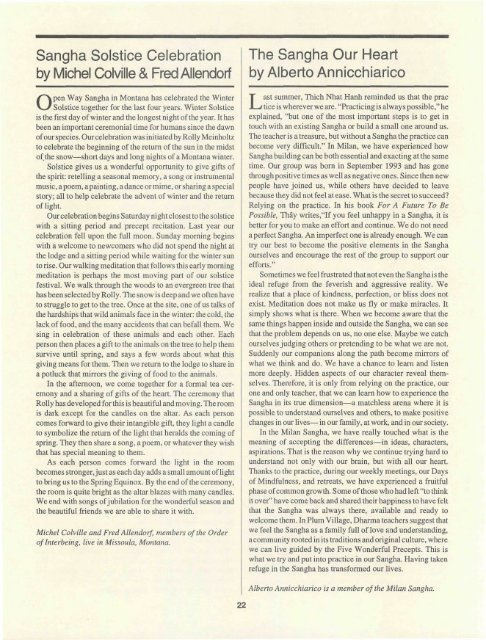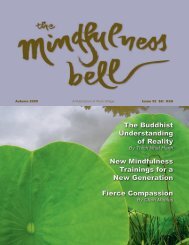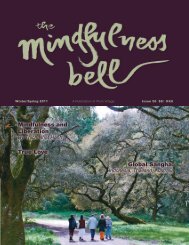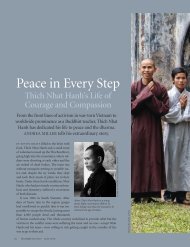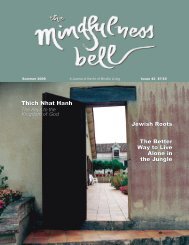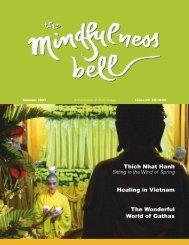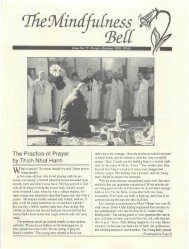J 'Bell - The Mindfulness Bell
J 'Bell - The Mindfulness Bell
J 'Bell - The Mindfulness Bell
You also want an ePaper? Increase the reach of your titles
YUMPU automatically turns print PDFs into web optimized ePapers that Google loves.
Sangha Solstice Celebration<br />
by Michel Colville & Fred Allendorf<br />
Open Way Sangha in Montana has celebrated the Winter<br />
Solstice together for the last four years. Winter Solstice<br />
is the first day of winterand the longest nightof the year. It has<br />
been an important ceremonial time for humanssincethe dawn<br />
of our species.Our celebrationwas initiated by Roily Mei nholtz<br />
to celebrate the beginning of the return of the sun inthe midst<br />
ofthe snow—short days and long nights of a Montana winter.<br />
Solstice gives us a wonderful opportunity to give gifts of<br />
thespirit: retelling a seasonal memory, a songor instrumental<br />
music, a poem, a painting, a dance or mime, or sharing a special<br />
story; all to help celebrate the advent of winterand the return<br />
of light.<br />
Our celebration begins Saturday night closest to the solstice<br />
with a sitting period and precept recitation. Last year our<br />
celebration fell upon the full moon. Sunday morning begins<br />
with a welcome to newcomers who did not spend the nightat<br />
the lodge and a sitting period while waiting for the wintersun<br />
to rise. Our walking meditation that follows this early morning<br />
meditation is perhaps the most moving part of our solstice<br />
festival. We walk through the woods toan evergreen tree that<br />
has been selected by Roily. <strong>The</strong> snow is deep and we often have<br />
to struggle to get to the tree. Once at the site, oneof us talks of<br />
the hardships thatwild animals face in the winter: the cold, the<br />
lackoffood, and the many accidents that can befall them. We<br />
sing in celebration of these animals and each other. Each<br />
person then places a gift to the animalson the tree to help them<br />
survive until spring, and says a few words about what this<br />
giving means for them. <strong>The</strong>n we return to the lodge to share in<br />
a potluck that mirrors the giving of food to the animals.<br />
In the afternoon, we come together for a formal tea ceremony<br />
and a sharing of gifts of the heart. <strong>The</strong> ceremony that<br />
Roily has developedfor this is beautiful and moving. <strong>The</strong> room<br />
is dark except for the candles on the altar. As each person<br />
comes forward to givetheir intangible gift, they light a candle<br />
to symbolize the return of the light that heralds thecomingof<br />
spring. <strong>The</strong>y then share a song, a poem,or whateverthey wish<br />
that has special meaning to them.<br />
As each person comes forward the light in the room<br />
becomes stronger, justas each dayadds a small amount of light<br />
to bring us to the Spring Equinox. By the endof the ceremony,<br />
the room is quite bright as the altar blazes withmany candles.<br />
We end with songs of jubilation for the wonderful season and<br />
the beautiful friends we are able to share it with.<br />
Michel Colville and Fred Allendorf, members of the Order<br />
of Interbeing, live in Missoula, Montana.<br />
<strong>The</strong> Sangha Our Heart<br />
by Alberto Annicchiarico<br />
Last summer, Thich Nhat Hanh reminded us that the prac<br />
tice is wherever we are. "Practicing is always possible," he<br />
explained, "but one of the most important steps is to get in<br />
touch with an existing Sangha or build a small one around us.<br />
<strong>The</strong> teacher is a treasure, but without a Sangha the practice can<br />
become very difficult." In Milan, we have experienced how<br />
Sangha buildingcanbe both essential and exacting at the same<br />
time. Our group was born in September 1993 and has gone<br />
through positive times as well as negative ones. Since then new<br />
people have joined us, while others have decided to leave<br />
because they did not feelat ease. What is the secret to succeed?<br />
Relying on the practice. In his book For A Future To Be<br />
Possible, Thay writes,"If you feel unhappy in a Sangha, it is<br />
better for you to makean effort and continue. We do notneed<br />
a perfect Sangha.An imperfect one is already enough. We can<br />
try our best to become the positive elements in the Sangha<br />
ourselves and encourage the rest of the group to support our<br />
efforts."<br />
Sometimes we feel frustrated that not even the Sangha is the<br />
ideal refuge from the feverish and aggressive reality. We<br />
realize that a place of kindness, perfection, or bliss does not<br />
exist. Meditation does not make us fly or make miracles. It<br />
simply shows what is there. When we become aware that the<br />
same things happen inside and outside the Sangha, we can see<br />
that the problem depends on us, no one else. Maybe we catch<br />
ourselves judging others or pretending to be what we are not.<br />
Suddenly our companions along the path become mirrors of<br />
what we think and do. We have a chance to learn and listen<br />
more deeply. Hidden aspects of our character reveal themselves.<br />
<strong>The</strong>refore, it is only from relying on the practice, our<br />
oneand only teacher, that wecan learn how to experience the<br />
Sangha in its true dimension—a matchless arena where it is<br />
possible to understand ourselves and others, to make positive<br />
changes in our lives— in our family, at work,and in our society.<br />
In the Milan Sangha, we have really touched what is the<br />
meaning of accepting the differences—in ideas, characters,<br />
aspirations. That is the reason why we continue trying hard to<br />
understand not only with our brain, but with all our heart.<br />
Thanks to the practice, during our weekly meetings,our Days<br />
of <strong>Mindfulness</strong>, and retreats, we have experienced a fruitful<br />
phase of common growth. Some of those who had left "to think<br />
it over" have come back and shared their happiness to havefelt<br />
that the Sangha was always there, available and ready to<br />
welcome them. In Plum Village, Dharma teachers suggest that<br />
we feel the Sangha as a family full of love and understanding,<br />
a community rootedin its traditions and original culture, where<br />
we can live guided by the Five Wonderful Precepts. This is<br />
what we try and put into practice in our Sangha. Having taken<br />
refuge in the Sangha has transformed our lives.<br />
Alberto Annicchiarico is a member of the Milan Sangha.


